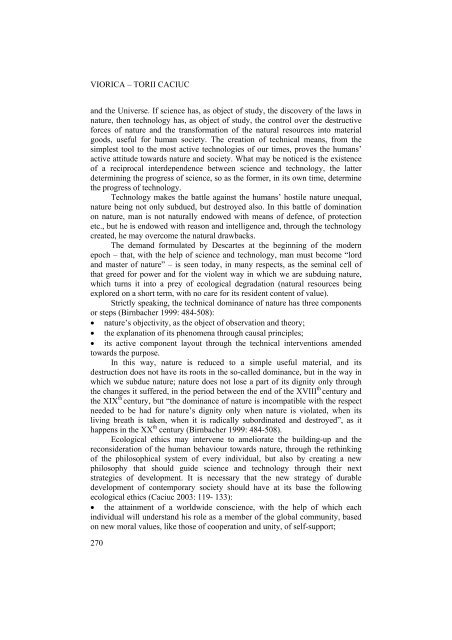culture, subculture and counterculture - Facultatea de Litere
culture, subculture and counterculture - Facultatea de Litere
culture, subculture and counterculture - Facultatea de Litere
You also want an ePaper? Increase the reach of your titles
YUMPU automatically turns print PDFs into web optimized ePapers that Google loves.
VIORICA – TORII CACIUC<br />
<strong>and</strong> the Universe. If science has, as object of study, the discovery of the laws in<br />
nature, then technology has, as object of study, the control over the <strong>de</strong>structive<br />
forces of nature <strong>and</strong> the transformation of the natural resources into material<br />
goods, useful for human society. The creation of technical means, from the<br />
simplest tool to the most active technologies of our times, proves the humans’<br />
active attitu<strong>de</strong> towards nature <strong>and</strong> society. What may be noticed is the existence<br />
of a reciprocal inter<strong>de</strong>pen<strong>de</strong>nce between science <strong>and</strong> technology, the latter<br />
<strong>de</strong>termining the progress of science, so as the former, in its own time, <strong>de</strong>termine<br />
the progress of technology.<br />
Technology makes the battle against the humans’ hostile nature unequal,<br />
nature being not only subdued, but <strong>de</strong>stroyed also. In this battle of domination<br />
on nature, man is not naturally endowed with means of <strong>de</strong>fence, of protection<br />
etc., but he is endowed with reason <strong>and</strong> intelligence <strong>and</strong>, through the technology<br />
created, he may overcome the natural drawbacks.<br />
The <strong>de</strong>m<strong>and</strong> formulated by Descartes at the beginning of the mo<strong>de</strong>rn<br />
epoch – that, with the help of science <strong>and</strong> technology, man must become “lord<br />
<strong>and</strong> master of nature” – is seen today, in many respects, as the seminal cell of<br />
that greed for power <strong>and</strong> for the violent way in which we are subduing nature,<br />
which turns it into a prey of ecological <strong>de</strong>gradation (natural resources being<br />
explored on a short term, with no care for its resi<strong>de</strong>nt content of value).<br />
Strictly speaking, the technical dominance of nature has three components<br />
or steps (Birnbacher 1999: 484-508):<br />
• nature’s objectivity, as the object of observation <strong>and</strong> theory;<br />
• the explanation of its phenomena through causal principles;<br />
• its active component layout through the technical interventions amen<strong>de</strong>d<br />
towards the purpose.<br />
In this way, nature is reduced to a simple useful material, <strong>and</strong> its<br />
<strong>de</strong>struction does not have its roots in the so-called dominance, but in the way in<br />
which we subdue nature; nature does not lose a part of its dignity only through<br />
the changes it suffered, in the period between the end of the XVIII th century <strong>and</strong><br />
the XIX th century, but “the dominance of nature is incompatible with the respect<br />
nee<strong>de</strong>d to be had for nature’s dignity only when nature is violated, when its<br />
living breath is taken, when it is radically subordinated <strong>and</strong> <strong>de</strong>stroyed”, as it<br />
happens in the XX th century (Birnbacher 1999: 484-508).<br />
Ecological ethics may intervene to ameliorate the building-up <strong>and</strong> the<br />
reconsi<strong>de</strong>ration of the human behaviour towards nature, through the rethinking<br />
of the philosophical system of every individual, but also by creating a new<br />
philosophy that should gui<strong>de</strong> science <strong>and</strong> technology through their next<br />
strategies of <strong>de</strong>velopment. It is necessary that the new strategy of durable<br />
<strong>de</strong>velopment of contemporary society should have at its base the following<br />
ecological ethics (Caciuc 2003: 119- 133):<br />
• the attainment of a worldwi<strong>de</strong> conscience, with the help of which each<br />
individual will un<strong>de</strong>rst<strong>and</strong> his role as a member of the global community, based<br />
on new moral values, like those of cooperation <strong>and</strong> unity, of self-support;<br />
270












